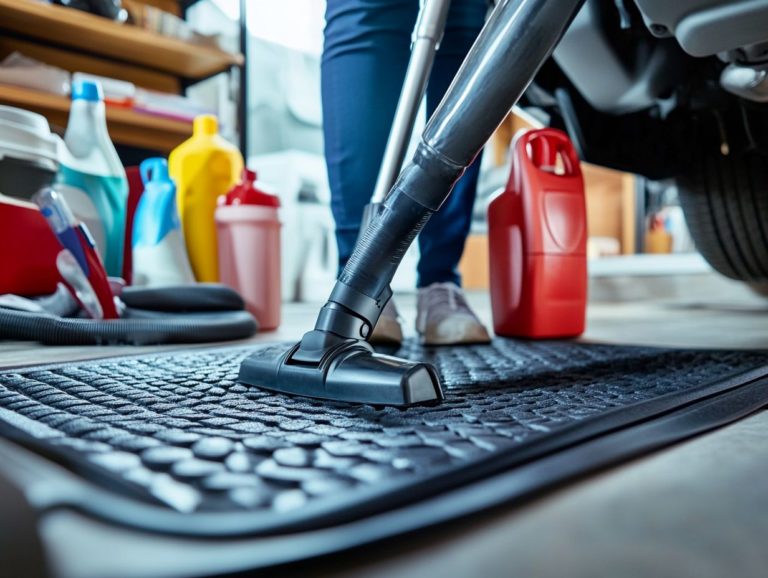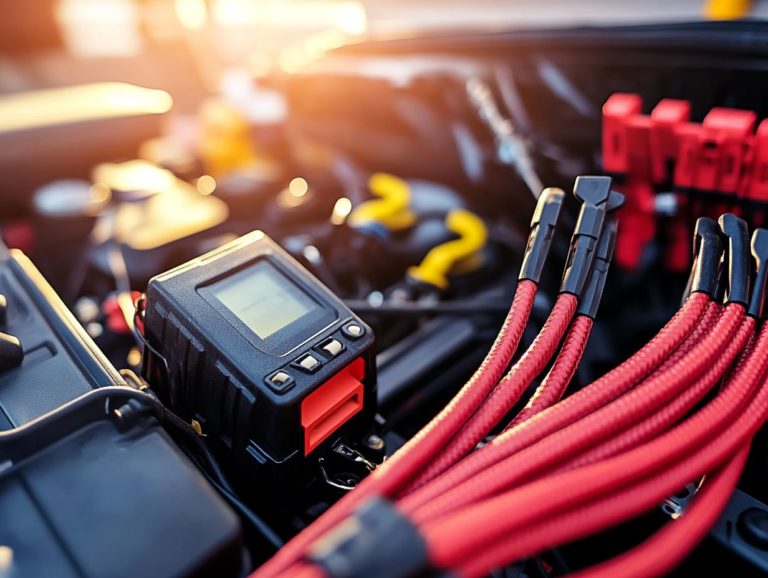How to Maintain Your Car During Winter
As winter draws near, it s essential to prepare your car for the challenging conditions ahead.
From inspecting vital components to mastering the art of navigating snowy roads, your preparation can significantly impact your safety and mobility.
This guide outlines the key steps for winterizing your vehicle, such as maintaining your battery, cleaning to prevent corrosion, and packing emergency essentials.
Arm yourself with the insights needed to face winter’s challenges with confidence while safeguarding your investment throughout the season.
Contents
- Key Takeaways:
- Preparing Your Car for Winter
- Tips for Driving in Winter Conditions
- Maintaining Your Car’s Battery
- Keeping Your Car Clean and Protected
- Preparing for Emergencies
- Frequently Asked Questions
- What are the essential steps to maintain my car during winter?
- How often should I check my car’s tire pressure during winter?
- What should I do if my car battery dies during winter?
- How can I prevent my car doors from freezing shut during winter?
- Is it necessary to change my car’s oil during winter?
- What should I do if my car gets stuck in snow or ice?
Key Takeaways:
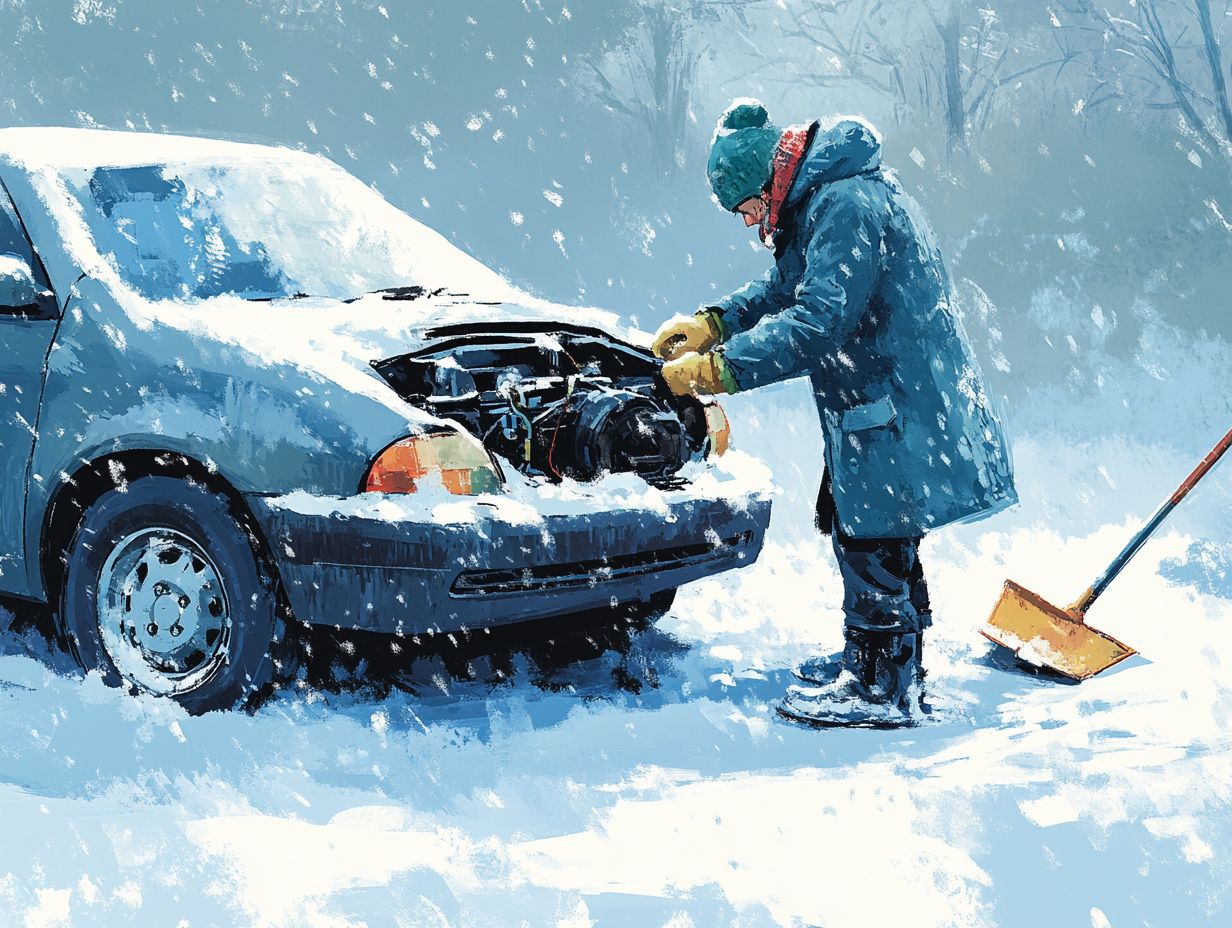
- Check and replace essential components before winter to prevent breakdowns on the road.
- Drive carefully in winter conditions by navigating snow, ice, and low visibility with caution.
- Maintain your car’s battery to prevent battery failure in cold temperatures and ensure it is properly charged.
Preparing Your Car for Winter
Preparing your car for winter is crucial to ensure safety and reliability throughout the challenging months, especially in regions like Colorado where snow and ice can turn roads into hazards. Following some tips for keeping your car clean and well-maintained can help you get ready for the season.
Ensuring your vehicle is ready for the cold involves a thorough check-up of its essential components. You’ll want to check antifreeze levels, tire pressure, and windscreen wiper fluid, making certain each is in prime condition to tackle the frigid weather ahead. Don’t forget to consider how to maintain your car’s battery health to prevent any issues during winter.
Checking and Replacing Essential Components
Checking and replacing essential components of your vehicle is crucial for ensuring it operates smoothly and safely during winter driving conditions, especially if you’re considering tips for buying used cars in winter.
Factors like tire tread and wiper blades significantly influence your vehicle s performance.
These critical elements include assessing your car battery, as it can help you avoid unexpected breakdowns when temperatures drop.
Ensuring proper tire tread depth not only enhances grip on slippery roads but also improves your overall vehicle handling.
Your wiper blades should be in top condition to guarantee visibility during snow or rain.
Regular brake inspections are essential for safety, as worn pads or discs can compromise your stopping distances and overall safety.
Maintaining appropriate fluid levels will prevent freezing and ensure all systems function correctly, providing you with peace of mind while navigating through harsh winter conditions.
Tips for Driving in Winter Conditions
Stay sharp and prepared for winter driving!
The challenges posed by snow, ice, and diminished visibility can significantly affect both road safety and vehicle performance.
Being aware of these factors is essential for a secure journey during the colder months.
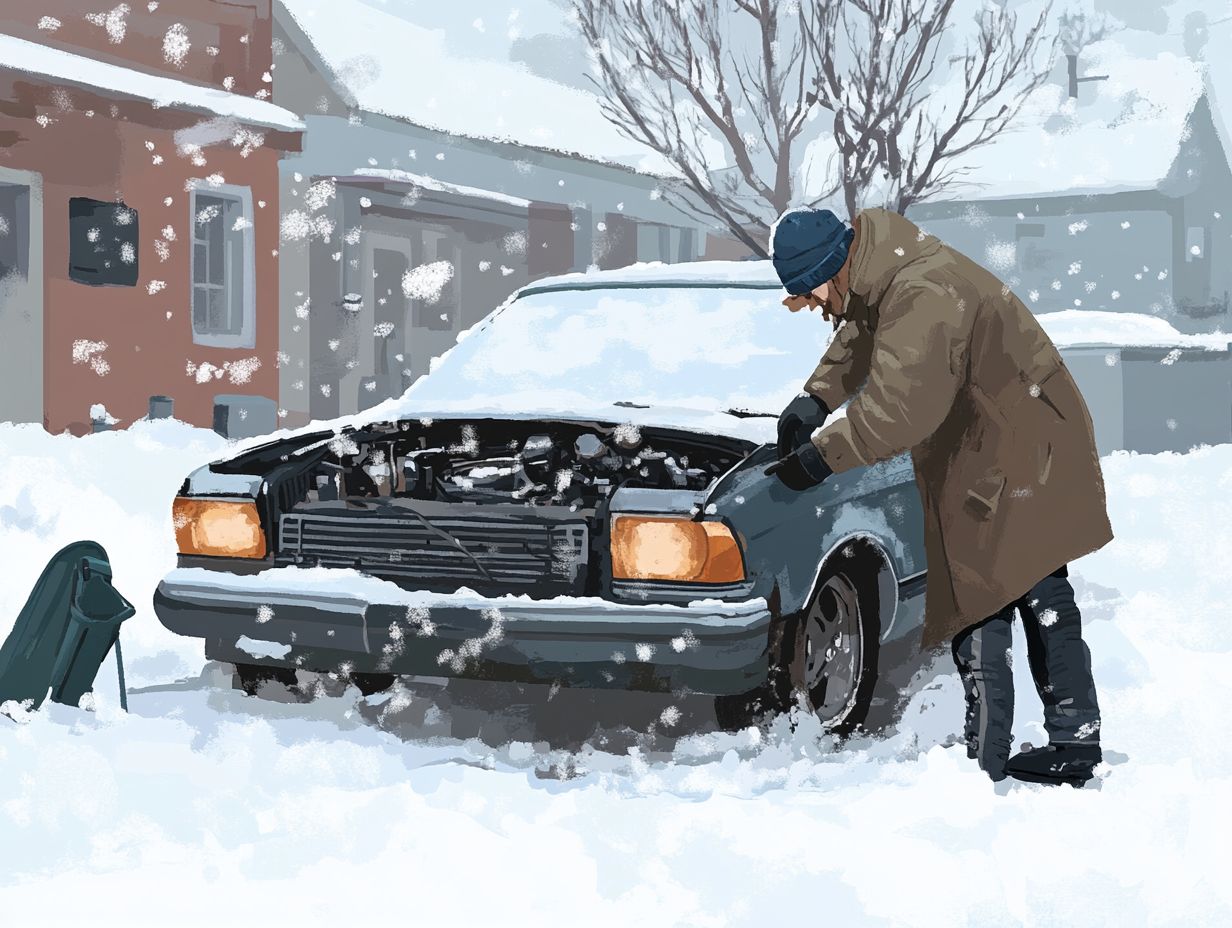
Navigating through snow, ice, and periods of low visibility demands specific driving techniques that elevate both safety and performance on the road.
When faced with these conditions, it’s essential to adjust your approach. Reducing speed and increasing your following distance allows for extended braking distances, giving you the room needed to react.
Utilizing your headlights even during the day can dramatically improve visibility not just for you but for other vehicles on the road as well.
Consider equipping your vehicle with winter tires, as they provide enhanced traction that can make all the difference.
Always be ready for surprises on the road! Carrying an emergency kit stocked with essentials like blankets, food, a flashlight, and a first-aid kit can be invaluable if you find yourself stranded.
By adopting these strategies and remaining vigilant, you can help ensure a safer journey through winter’s challenging elements.
Maintaining Your Car’s Battery
Maintaining your car’s battery becomes paramount in cold weather, as extreme temperatures can profoundly impact its performance and longevity. To ensure your vehicle is ready, consider following this guide on how to prepare for seasonal vehicle maintenance.
Don t wait until the first snowfall to check your battery! It’s essential for you to conduct regular checks and tests, ensuring that you prevent any potential battery failures before they occur.
Taking these proactive steps, including understanding how to maintain your car’s transmission, will safeguard your vehicle’s reliability, even in the harshest conditions.
Get your car winter-ready today and drive with confidence!
Preventing Battery Failure in Cold Temperatures
Preventing battery failure in cold weather requires a proactive approach and an understanding of how extreme temperatures can impact performance and reliability.
To ensure your battery functions optimally, keep it fully charged. A low charge can amplify issues in chilly conditions. Regularly check connections for signs of corrosion or looseness, as poor connections can impede the charging process.
Understanding how cold weather affects batteries is crucial; they can lose substantial capacity when exposed to frigid air. By consistently implementing these maintenance practices, you can extend your battery’s lifespan and enhance its reliability during harsh winter months.
Keeping Your Car Clean and Protected
Maintaining a clean and protected vehicle throughout winter is essential to safeguard it against the damaging effects of road salt and magnesium chloride. For comprehensive tips, refer to the ultimate checklist for seasonal car maintenance.
These substances contribute to long-term corrosion and deterioration of your car’s surfaces, compromising both its appearance and integrity.
Removing Salt and Protecting Against Corrosion
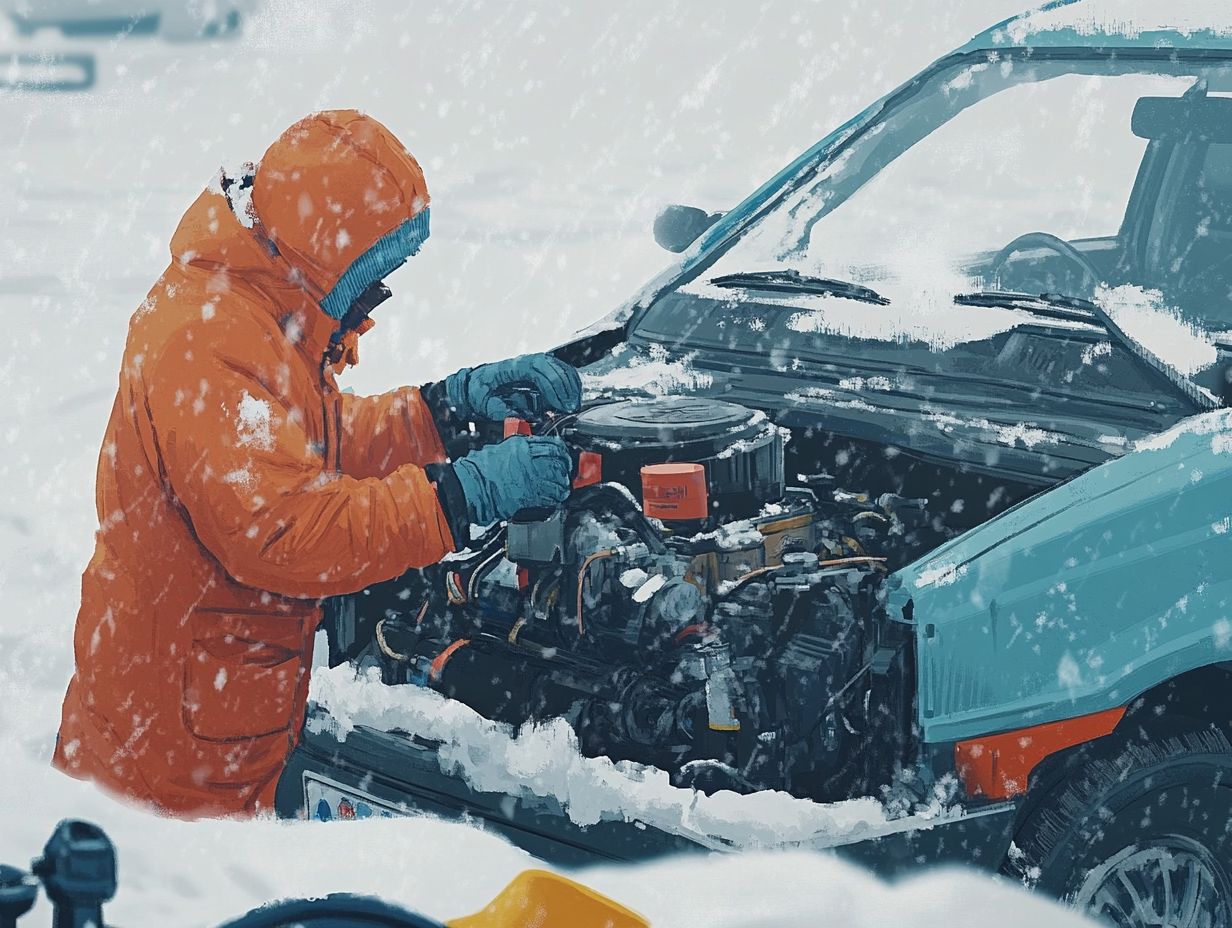
Removing salt and protecting against corrosion is essential for extending your vehicle’s lifespan, especially after exposure to winter road treatments and harsh chemicals.
Regular maintenance is key; wash your car every two weeks during winter to curb salt accumulation. For detailed advice on keeping your vehicle in top shape, check out how to prepare your car for winter. A high-pressure washer is best for reaching stubborn spots, like wheel wells and undercarriages, where salt loves to hide.
Applying a protective coating, such as wax or ceramic sealant, creates a strong barrier against moisture and grime, further protecting your paint and metal surfaces.
Don’t overlook the importance of routinely checking and cleaning the drains in your vehicle’s body to prevent water retention, a sneak contributor to rust. Stay diligent with these practices, and you ll preserve your vehicle’s aesthetic appeal.
Preparing for Emergencies
Be ready for winter surprises! Preparing for emergencies while navigating winter driving conditions is essential. Assemble a comprehensive emergency kit with vital supplies and safety tools to ensure you’re ready for unforeseen circumstances on the road.
What to Keep in Your Car for Winter Emergencies
Having an emergency kit in your car, specifically designed for winter emergencies, can greatly enhance your safety during unexpected moments.
When faced with icy conditions, winter weather can be unpredictable. You might be cruising along one minute and find yourself stuck or caught in a snowstorm the next.
To bolster your safety, ensure your kit includes items tailored for winter challenges:
- Warm blankets to retain body heat
- Nutritious food that won t spoil
- Ample water for hydration
- Safety supplies such as a flashlight, extra batteries, flares, and a first-aid kit
Regularly check and update your kit to ensure everything remains functional for harsh winter conditions. Don t wait! Prepare your emergency kit today!
Frequently Asked Questions
What are the essential steps to maintain my car during winter?

To maintain your car during winter, start by checking your tires, replacing old fluids, and utilizing winter-specific products such as antifreeze and windshield wiper fluid.
How often should I check my car’s tire pressure during winter?
Check your tire pressure at least once a week during winter, as cold weather can cause it to decrease.
What should I do if my car battery dies during winter?
If your car battery dies during winter, use jumper cables to jump-start your car or call a professional for assistance.
Check your vehicle now to ensure it s ready for winter driving!
How can I prevent my car doors from freezing shut during winter?
Prevent your car doors from freezing shut by applying a thin layer of petroleum jelly on the rubber seals around the doors. You can also use a de-icer spray for added protection.
Is it necessary to change my car’s oil during winter?
Changing your car’s oil during winter is important, but don’t forget about other maintenance tasks as well, such as maintaining your car’s climate control. Cold weather can thicken the oil, making it less effective at lubricating your engine.
What should I do if my car gets stuck in snow or ice?
If your car gets stuck, stay calm. Avoid spinning your wheels; instead, try rocking the car back and forth or use sand, kitty litter, or cardboard for traction.



